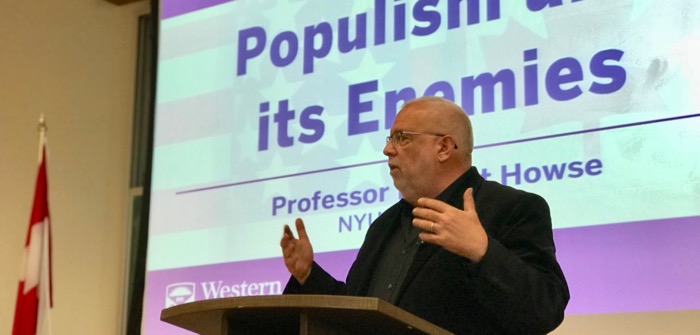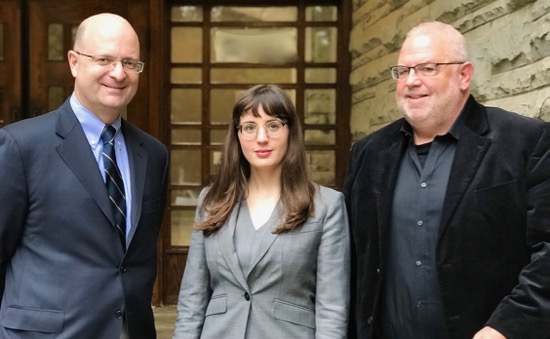CUSLI Distinguished Lecture explores populism and democracy
October 12, 2018

On October 1 at Western Law, Professor Robert Howse of New York University School of Law explored the subject of political populism in the 12th Annual Canada-United States Law Institute Distinguished Lecture. Watch the lecture on YouTube.
While Professor Howse’s lecture focused on the recent rise of populism in the United States, Howse is no stranger to Canada. Currently the Lloyd C. Nelson Professor of International Law at NYU Law, Howse was raised in Toronto and previously worked at Canada’s Department of Foreign Affairs. He then taught at the University of Toronto Faculty of Law and University of Michigan Law School before moving to NYU in 2008.
“We were fortunate to have a distinguished lecturer with such a binational background to provide insight into current political trends at this unsettled time in Canada-U.S. relations,” said Professor Chi Carmody, Canadian National Director of the Institute. “Robert fit the bill admirably.”
In his address, Professor Howse began with an overview of past theories and definitions of populism ranging from Aristotle to James Madison. He argued that populism might be defined as support for the concerns of ordinary people.

Chi Carmody, Joanna Langille, Robert Howse
Turning to the current political climate in the United States, Howes asserted that while populism is often viewed negatively, we can identify many virtues of the populist movement that we could consider to be essentially democratic virtues.
And the current association of populism with exclusionary nativism has obscured these virtues.
“Populism can be something quite healthy and maybe necessary because of the decline or rot that has arguably set into many of our democratic institutions,” he said.
Howse said that if one looks at who’s been running for office successfully, it’s usually a relatively small group of people who “develop careers as professional politicians and have to operate through party fundraising and organizational structures” which tend to vet out so called “ordinary people”.But Howse noted that change is starting to be apparent with the rise of progressive populism in the U.S., represented by figures such as Bernie Sanders and Alexandria Ocasio-Cortez, a democratic congressional candidate from New York.
“We are now moving away from the idea that the political class is basically a kind of money class or celebrity class to the idea that any citizen can imagine that in the right circumstances they might be eligible for and be able to directly participate in elected political office,” Howse said.
This year’s CUSLI Distinguished Lecture was co-organized by Western Law Professor Carmody and by Professor Joanna Langille, who joins the Institute as Canadian Deputy National Director. Langille, a Canadian, received her JD from NYU Law, clerked with the judges of the Ontario Court of Appeal and is currently completing her SJD at University of Toronto Faculty of Law.
The Institute was founded in 1976 as a joint creation of Western Law and the Case Western School of Law in Cleveland, Ohio to examine legal issues relevant to the Canada-U.S. context.






